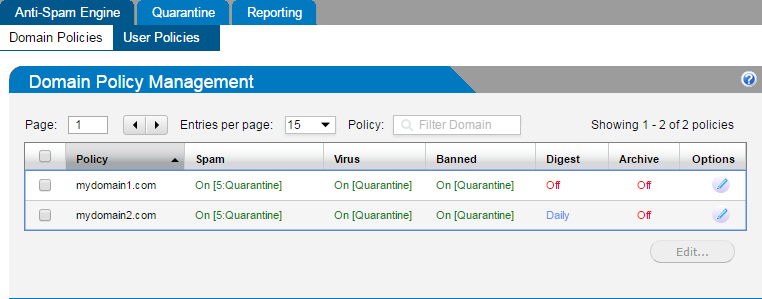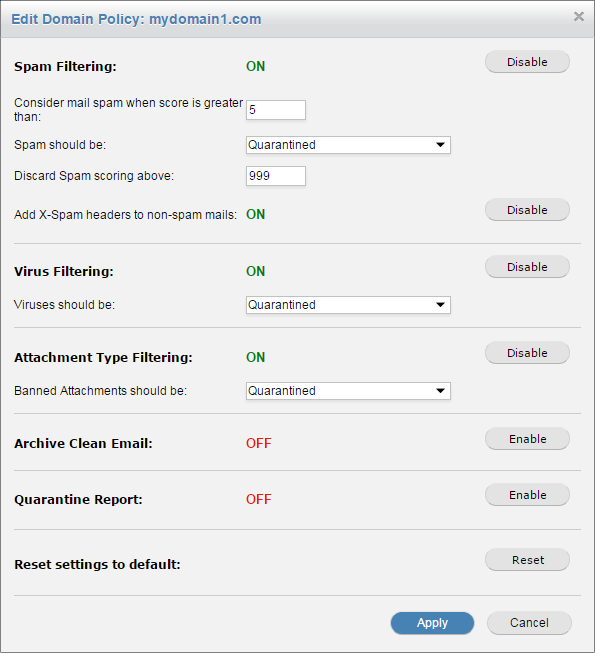Domain Policies
Use the Security Domains Policy settings to apply anti-virus, anti-spam, and other filtering mechanisms on emails processed on a per-domain basis.

DomainAddress or URL of a particular network. Policies page
To access the Domain Policies screen:
- Login to GFI MailSecurity.
- Key in your Administrator account credentials in the login screen.
- Choose the Domain Group Administrator role from the top-right corner Role field.
- Navigate to Anti-SpamAn irrelevant or unsolicited email sent over for the purposes of advertising, phishing, spreading malware, etc. Engine > Domains Policies.
- Choose a domain and click the
 icon to configure the domain's filtering options. These domain settings are inherited by all users in those domains.
icon to configure the domain's filtering options. These domain settings are inherited by all users in those domains.

Edit Domain Policy dialog
Configure the following options:
| Option | Description | Default value |
|---|---|---|
| Spam Filtering |
Specifies whether spam filtering is enabled for the selected domain. Toggle Enable / Disable to switch this option on or off. |
ON |
| Consider mail spam when score is greater than |
When scanning messages for spam, GFI MailSecurity applies various checks to determine an overall spam score for each message. Emails scoring above this threshold are considered as spam. Emails scoring below the threshold is considered legitimate and passed onto the recipient(s) If you find this setting too aggressive or not aggressive enough, then you can change the threshold. |
5 |
| Spam should be |
Action to perform when a message is classified as spam:
|
Quarantined |
| Discard Spam scoring above |
Messages scoring above the specified score is automatically discarded. This option is only available when the action is set to Quarantined. |
999 (no messages is discarded) |
| Spam Modifies Subject | Enable this option to prepend text to the Subject header, indicating that the message has been identified as spam. Specify an appropriate Spam Subject Tag to be added to the subject. This option is only available when the action is set to Passed (Tagged). | OFF |
| Add X-Spam headers to non-spam mails |
Specifies if additional headers are added to inbound messages, indicating the result of the spam analysis. The headers added are:
Toggle Enable / Disable to switch this option on or off. |
ON |
| Virus Filtering |
Specifies whether virus filtering is enabled for the selected domain. Toggle Enable / Disable to switch this option on or off. |
ON |
| Viruses should be |
The action to perform when a message is identified as containing a virus. Refer to the actions documented in the anti-spam section above. |
Quarantined |
| Attachment Type Filtering | Specifies whether the default GFI MailSecurity message attachment policy is applied to messages received by recipients in the selected domain. Toggle Enable / Disable to switch this option on or off. The blocked attachment types are: .vbs, .scr, .pif, .js, flv, .exe, .dll, .com, .cmd, and .bat. |
ON |
| Banned Attachments should be |
The action to perform when a message is blocked by Attachment Type Filtering:
|
Quarantined |
| Archive Clean Email |
Enable this setting to store all clean messages received by this domain in the history. (Go to Reporting > History to view clean emails.) Toggle Enable / Disable to switch this option on or off. |
OFF |
| Quarantine Report |
This field specifies whether quarantine reports should be generated for recipients in this domain. A quarantine report is generated for each recipient who has at least one email quarantined. Toggle Enable / Disable to switch this option on or off. |
OFF |
| Language |
If enabling quarantine reports, select the default report language. Recipients may change the language of their report by logging into GFI MailSecurity and changing their preferences. |
English |
| Email report every |
If enabling quarantine reports, select the frequency of the reports. Reports may be generated every day, every weekday (Monday to Friday), every Friday, or every month. Recipients may change the frequency of their reports by logging into GFI MailSecurity and changing their preferences. |
Day |
| Report contains |
If enabling quarantine reports, choose the items to show in the report. Recipients may change this option of their report by logging into GFI MailSecurity and changing their preferences. The report may include:
|
New items since last report only |
| Exclude spam mails scoring above |
Usually, users are only interested in messages that fall just above the spam threshold to look for false positivesLegitimate emails that are incorrectly identified as spam.. Spam messages scoring above a certain threshold can be unequivocally deemed as spam. If users get a significant amount of spam, then to keep the report size manageable you can exclude spam messages above, for example 30. This setting is set to 999 by default, meaning that no messages is excluded (as a message cannot score that high). |
999 (no messages is excluded) |
| Reset settings to default |
Reset the policy to default values. |
- Click Apply to save settings.